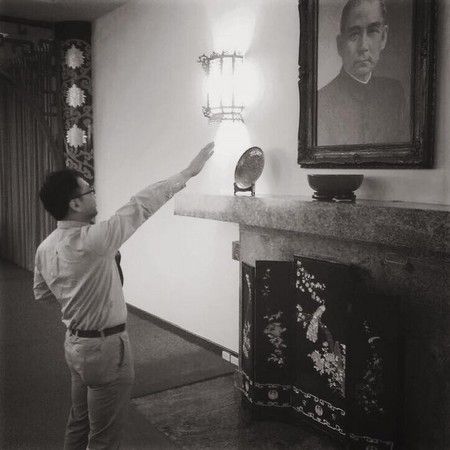The two republics: A Sverdlovsk-Tomsk reunification canon
Part Two: The reclamation war and Gorbachev's story
Mikhail Gorbachev, formerly a prominent functionary of Bronislav Kaminski's collaborationist clique in Nazi-occupied Russia, pictured during a public campaign event for the Mayorship of the reclaimed old Russian capital of Moscow, on the Humanist ticket. Circa 1981. Though Russian collaborators of the Nazi regime are normally despised and even prosecuted, Gorbachev's record of doing all that he could to support his fellow Russian subjects, before the Great Reclamation War, had made him a well-respected figure within the liberated lands.
With the formation of the Russian Republic, the Sakharov/Yeltsin coalition government did not waste time making preparations for liberation of the Reich's eastern holdings. The timing seemed quite ideal, considering that Germany was embroiled in a economic and political turmoil, which the ailing Fuhrer Martin Bormann was finding difficult to remedy. Nonetheless the Great Reclamation War (alternatively called the Second West Russian War or the Third Great Patriotic War) would be really challenging for the free Russians, who would find themselves in an uphill struggle against the overlord of Europe. Fortunately, they would still hold a combination of advantages that would help them endure, particularly; Marshall Batov's superb military leadership, Sakharov's modernization schemes forging the most advanced Russian army yet in history, heavy aid from the United States under President Jeanne Kirkpatrick and the OFN as a whole (one case being the UK sending David Sterling, the controversial yet prominent former resistance fighter, alongside other veterans of the English Civil War, to serve as advisors, with Sterling himself playing a big role in shaping up the Republic's Spetsnaz forces). The Republic would also come to utilize former military personnel of the Eurasianist and Sablinite regimes, that would come to have some consequences down the line.
The GRW would last from August 24th of 1973 to October 7th of 1976. It would begin with the Reich's expected refusal of the Republic's ultimatum to give up their Eastern territories and ended when the Reich began facing impending economic collapse from the exhaustion of the war, as well as further heightened internal political instability after the death of Bormann, whose purging of the Nazi party and Whermacht leadership beforehand proved self-damaging. Therefore, the emergency government in Germania, decided to come to the table with the Russians (who had just breached the defences of annexed Crimea, and started encroaching onto Ostland), in a conference in Stockholm, Sweden. An armistice would be signed, that saw occupied western Russia, the north Caucasus, Crimea and the Donbass region of east Ukraine annexed directly into the Russian Republic. The south Caucasus would be joined together to form the Transcaucasian republic, which would be in confederation with Russia, similar to Kazakhstan. Ukraine would be established as an independent, neutral buffer state. Ostland would be left under German auspices, to the ire of many Russians though Sakharov understood that the peace deal would be as good as he is getting and to go any further would risk nuclear war. However the rights, and a measure of autonomy for the natives of Ostland would be guaranteed, likewise for the Volga Germans. The German settlers, and descendants of such, would be deported from the retaken lands, but in a gradual and orderly fashion.
In time, the Russian Republic would reintegrate their lands, and prosecute the collaborators. Death penalties and long-term imprisonment would be handed to the most high level and brutal offenders, the chief example being Kaminski, who was sentenced to death-in-absentia, as he lived in exile in Germany. Yet punishments for most would be light or non-existent, as it would be found that many collaborated out of support for their families and the interest of their communities. The most prime example would be Mikhail Gorbachev. Having lived under the Nazis past his teenage years, Gorbachev, seeing the WRRF's failure to liberate west Russia, and the subsequent degeneration into warlordism, would come to believe that the best way to help the people of Russia at the moment would be to do what one could within the system of Reichskommissariat Moskowien. Joining the Slavic bloc of the Ostvolk council, Gorbachev would first gain notice,
when he was the first to voice out against a proposal by a German general to start forcibly relocating Russian subject to the border with the Russian warlords, thereby putting them in harms way of Luftwaffe terror bombing and bandit raids. In the advent of the Nazi governor; Siegfried Kasche's mysterious disappearance (future investigations would find that he relocated to Palm Beach Florida, where he lived for the remainder of his life) in the aftermath of the German Civil Wars outbreak in October 1963. A hasty agreement was reached between the collaborators, lead by Kaminski and acting Reichskommisar Erich Von Dem Bach, which divided Moskowien into separate administrations; the Moscow Autonomy and the German Sovereign Zone, based roughly on the geographic demographics of the Slavic and German communities. Gorbachev would find himself appointed by Kaminski as the local governor of the Smolensk Oblast. There he would gain a reputation of being fair and selfless whereas other collaborators of his status would be greedy and corrupt. While resources would always be stretched thin, Gorbachev would preside over rural development, hunger relief and other public work. He would come to blows with Kaminski, criticizing his brutal methods in quelling partisan unrest, and Kaminski had even planned to purge Gorbachev when he suggested proposing an unconditional amnesty to convince partisans to give up their revolt, only relenting when many of his underlings vouched for Gorbachev on his effectiveness in pacifying the populace under his authority.
Gorbachev's stint as governor would end when, in 1967 Bormann entered negotiations with Kaminski, that formalized the separation of Moskowien, and transformed the Moscow autonomy into Reichsprotektorat Russland. Gorbachev was rendered impotent in this arrangement, as he feuded with German bureaucrats moved in and assumed much of his responsibilities. With the onset of the GRW, Kaminski ordered Gorbachev detained in a labour facility on account of the discovery of his sympathies to the Russian Republic, being freed by Batov's soldiers on June 18th 1976. After the wars end, Gorbachev would make contact with the Humanists, whose chairman; Mieczysław Weinberg would embrace him on account of Gorbachev embodying the party's core values of compassion to his fellow man, in his effort to improve the lot of the Russians under German domination. Gorbachev would successfully become elected mayor of Moscow in 1982, in large part due to the locals having been well aware of his reputation. As mayor Gorbachev would do his best to revitalize of the old city, but the wars and decades of lackluster development under the Nazis have taken it's toll. Nowadays, Yekaterinburg (renamed from Sverdlovsk) and Tomsk are seen as the economic and cultural centres of Russia, with the latter being one of the technology hubs of Eurasia.



